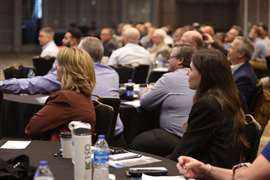Read this article in Français Deutsch Italiano Português Español
The role of incentives, objectivity in decarbonization
27 May 2024
In his planned presentation for the Power Progress Summit, Dan Romito of Pickering Energy Partners will discuss the political vs. practical approach to reducing emissions. His presentation will focus on the role politics plays in choosing certain emissions or decarbonization technologies and whether such choices are also the most practical ones.
 Dan Romito, managing director for energy-focused financial services company Pickering Energy Partners. (Photo: Pickering Energy Partners)
Dan Romito, managing director for energy-focused financial services company Pickering Energy Partners. (Photo: Pickering Energy Partners)
In talking to Power Progress about the nature of his presentation, Romito said the current political landscape fosters a tendency to choose winning and losing technologies in advance of allowing the market to determine the outcome.
“There’s this tendency, at least in this administration, to implement much more of a ‘stick’ mentality as opposed to a ‘carrot’ mentality,” he said. As a result, Romito said that regulations are being put in place to cause some technologies to succeed at the expense of other approaches.
“So when we see the dichotomy between policy and solutions, usually those things are intertwined,” he said. “But the government has been implementing policies that penalizes thing that they don’t like as opposed to implementing incentive structures to solve problems that they have to address.”
One reason for this phenomenon, Romito said, is that politics results in a kind of tribalism, which leads to an echo chamber that reinforces certain accepted views over other possibilities. He added that there can be unintended negative consequences of certain approaches to reducing emissions that are minimized or ignored in the process. An example Romito used is the drive to net zero emissions in the U.S.
“Emissions management is a function of economics and finance, and a function of socio-economic considerations, and there’s definitely a geopolitical element there” Romito said. “Those are all various levers that you have to balance. And to say we’re just going to go zero emissions and everything else is an afterthought — there’s a whole variety of consequences associated with that.”
Romito also called for additional objectivity in evaluating emissions reduction, saying that “it’s become incredibly emotional.” He said the objectivity and quantitative evidence OEMs can offer will be the best way to counteract emotional arguments.
“As companies become more savvy and more sophisticated in data tracking and as they become better versed in installing a higher degree of confidence in the data that they’re conveying within the public realm, they don’t have to continue fighting emotional arguments with counter emotional arguments,” he said.
Instead, companies will be able to discuss the economics of emissions and how they are being creative in the face of those economic realities, Romito said. OEMs will also be able to objectively address their vulnerabilities or shortcomings regarding emissions reduction while discussing their plans for improvement.
Romito added that such a conversation will have to transcend a traditional marketing approach.
“I realize that might be a little bit of pie in the sky,” he said. “But if you look at how it’s done today — a lot of PR, a lot of spin, a lot of marketing, a lot of fluff, and not as much data, not as much context. I’m not saying there isn’t a place for PR and marketing, as well — there certainly is. But I would like to see where those those roles reversed, where it’s more geared toward quantitative data, trends, progress, constructive narrative.”
POWER SOURCING GUIDE
The trusted reference and buyer’s guide for 83 years
The original “desktop search engine,” guiding nearly 10,000 users in more than 90 countries it is the primary reference for specifications and details on all the components that go into engine systems.
Visit Now
STAY CONNECTED




Receive the information you need when you need it through our world-leading magazines, newsletters and daily briefings.
CONNECT WITH THE TEAM















